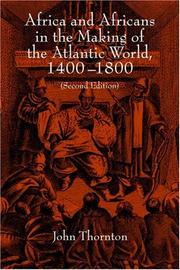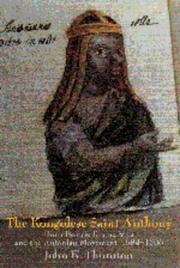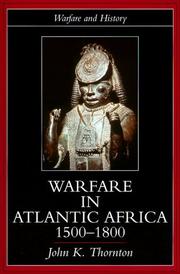| Listing 1 - 10 of 15 | << page >> |
Sort by
|

ISBN: 9780521627245 9780511800276 9780521622172 0511800274 9781139648899 1139648896 0521622174 0521627249 0521593700 9780521593700 0521596491 9780521596497 9781139939294 1139939297 1139636340 9781139636346 1316087530 9781316087534 1139638440 9781139638449 113964128X 9781139641289 9781139643382 113964338X Year: 1998 Publisher: Cambridge Cambridge University Press
Abstract | Keywords | Export | Availability | Bookmark
 Loading...
Loading...Choose an application
- Reference Manager
- EndNote
- RefWorks (Direct export to RefWorks)
History of Europe --- History of Africa --- History of North America --- anno 1500-1799 --- anno 1400-1499
Multi
ISBN: 9780521898751 9780521727341 0521898757 0521727340 9781139021722 9781139525664 1139525662 1283610728 9781283610728 1139021729 1139539671 1316089215 9786613923172 1139526863 1139531522 113953033X 113952805X Year: 2012 Publisher: Cambridge Cambridge University Press
Abstract | Keywords | Export | Availability | Bookmark
 Loading...
Loading...Choose an application
- Reference Manager
- EndNote
- RefWorks (Direct export to RefWorks)
A Cultural History of the Atlantic World, 1250-1820 explores the idea that strong links exist in the histories of Africa, Europe and North and South America. John K. Thornton provides a comprehensive overview of the history of the Atlantic Basin before 1830 by describing political, social and cultural interactions between the continents' inhabitants. He traces the backgrounds of the populations on these three continental landmasses brought into contact by European navigation. Thornton then examines the political and social implications of the encounters, tracing the origins of a variety of Atlantic societies and showing how new ways of eating, drinking, speaking and worshipping developed in the newly created Atlantic World. This book uses close readings of original sources to produce new interpretations of its subject.
History of civilization --- Civilization, Modern. --- Atlantique (région) --- Atlantic Ocean Region --- Civilisation --- Histoire --- History. --- Civilization. --- Africa --- Europe --- United States --- Relations --- Civilization, Modern --- Modern civilization --- Modernity --- Civilization --- Renaissance --- History --- Atlantic Area --- Atlantic Region --- Civilisation. --- Histoire. --- Arts and Humanities --- Atlantique (région)
Book
ISBN: 0299092909 9780299092900 Year: 1983 Publisher: Madison (Wis.) : University of Wisconsin press,
Abstract | Keywords | Export | Availability | Bookmark
 Loading...
Loading...Choose an application
- Reference Manager
- EndNote
- RefWorks (Direct export to RefWorks)
Kongo Kingdom --- History --- Histoire --- History. --- Kingdom of Kongo --- Kongo Kingdom - History

ISBN: 0521627249 0521622174 1139638440 1139648896 113964128X 0511800274 1139636340 1316087530 9781139643382 Year: 1998 Publisher: Cambridge : Cambridge University Press,
Abstract | Keywords | Export | Availability | Bookmark
 Loading...
Loading...Choose an application
- Reference Manager
- EndNote
- RefWorks (Direct export to RefWorks)
This 1998 book explores Africa's involvement in the Atlantic world from the fifteenth century to the eighteenth century. It focuses especially on the causes and consequences of the slave trade, in Africa, in Europe, and in the New World. African institutions, political events, and economic structures shaped Africa's voluntary involvement in the Atlantic arena before 1680. Africa's economic and military strength gave African elites the capacity to determine how trade with Europe developed. Thornton examines the dynamics of colonization which made slaves so necessary to European colonizers, and he explains why African slaves were placed in roles of central significance. Estate structure and demography affected the capacity of slaves to form a self-sustaining society and behave as cultural actors, transferring and transforming African culture in the New World.
#SBIB:96G --- #SBIB:39A73 --- Geschiedenis van Afrika --- Etnografie: Afrika --- Africa -- Relations -- America. --- America -- Relations -- Africa. --- Europe -- History -- 1492-1648. --- Europe -- Relations -- Africa. --- Slavery. Africa -- Relations -- Europe. --- Slavery. --- Africa --- Europe --- America --- Relations --- History --- Esclavage --- Afrique --- Amérique --- Histoire --- Slavery --- History & Archaeology --- Regions & Countries - Africa --- Abolition of slavery --- Antislavery --- Enslavement --- Mui tsai --- Ownership of slaves --- Servitude --- Slave keeping --- Slave system --- Slaveholding --- Thralldom --- Crimes against humanity --- Serfdom --- Slaveholders --- Slaves --- Americas --- New World --- Western Hemisphere --- Eastern Hemisphere --- Council of Europe countries --- Eurasia --- 1492-1648 --- Africa - Relations - America. --- America - Relations - Africa. --- Arts and Humanities --- Enslaved persons

ISBN: 0521593700 0521596491 1322176450 0511572794 1139929569 1139939297 1139936980 1139933787 1139931768 1139927485 9781139939294 9780511572791 9781139931762 9780521593700 9780521596497 Year: 1998 Publisher: Cambridge Cambridge University Press
Abstract | Keywords | Export | Availability | Bookmark
 Loading...
Loading...Choose an application
- Reference Manager
- EndNote
- RefWorks (Direct export to RefWorks)
This book tells the story of the Christian religious movement led by Dona Beatriz Kimpa Vita in the Kingdom of Kongo from 1704 until her death, by burning at the stake, in 1706. Beatriz, a young woman, claimed to be possessed by St Anthony, argued that Jesus was a Kongolese, and criticized Italian Capuchin missionaries in her country for not supporting black saints. The movement was largely a peace movement, with a following among the common people, attempting to stop the devastating cycle of civil wars between contenders for the Kongolese throne. Thornton supplies background information on the Kingdom, the development of Catholicism in Kongo since 1491, the nature and role of local warfare in the Atlantic slave trade, and contemporary everyday life, as well as sketching the lives of some local personalities.
#SBIB:39A10 --- #SBIB:96G --- Antropologie: religie, riten, magie, hekserij --- Geschiedenis van Afrika --- Vita, Beatriz Kimpa, --- Anthony, --- Congo (Kingdom) --- Congo (Royaume) --- Anthony, of Padua, Saint, 1195-1231 -- Cult -- Kongo Kingdom. --- Christian biography -- Kongo Kingdom. --- Christianity and politics --Kongo Kingdom -- History -- 18th century. --- Vita, Beatriz Kimpa, -1706. --- 266 <675> --- 271.36 <675> --- 299.6*1 --- Missies. Evangelisatie. Zending--Zaïre. Belgisch Kongo --- Minderbroeders: Kapucijnen--Zaïre. Belgisch Kongo --- Nieuwe Afrikaanse godsdiensten: Kimbangisme; messiaanse bewegingen --- Vita, Beatriz Kimpa --- Anthony of Padua, Saint --- -Kongo Kingdom --- -Christian biography --- -Missies. Evangelisatie. Zending--Zaïre. Belgisch Kongo --- -Vita, Beatriz Kimpa --- -Anthony, of Padua, Saint, 1195-1231 -- Cult -- Kongo Kingdom. --- 299.6*1 Nieuwe Afrikaanse godsdiensten: Kimbangisme; messiaanse bewegingen --- 271.36 <675> Minderbroeders: Kapucijnen--Zaïre. Belgisch Kongo --- -299.6*1 Nieuwe Afrikaanse godsdiensten: Kimbangisme; messiaanse bewegingen --- -Arts and Humanities --- -266 <675> --- Christian biography --- Christianity and politics --- History --- Catholic Church --- Cult --- Kongo Kingdom --- Politics and government --- Church history --- Christianity --- Church and politics --- Politics and Christianity --- Politics and the church --- Political science --- Christian life --- Christians --- Church biography --- Ecclesiastical biography --- Biography --- Religious biography --- Political aspects --- Antoine, --- Antoni Padewski, --- Antoni, --- Antonio da Padova, --- Antonio, --- António, --- Antonius, --- Antony, --- Bulhões, Fernando de, --- Bullones, Fernando de, --- Lisboa, António de, --- Martins de Bulhões, Fernando, --- Ontōns, --- Padova, Antonio da, --- Padovas, Ontōns nu, --- Padua, Anthony of, --- Padwy, Antoni z, --- Patavinus, Antonius, --- Anṭūiyūs, --- Chimpa Vita, --- Kimpa Vita Nsimba, --- Vita, Béatrice Kimpa, --- Kingdom of Kongo --- Christian religion --- Religious studies --- anno 1700-1799 --- anno 1600-1699 --- Congo --- Africa --- Biographies chrétiennes --- Christianisme et politique --- Histoire --- Eglise catholique --- Politique et gouvernement --- Histoire religieuse --- Kongo (Kingdom) --- 18th century --- History of Congo --- Antun, --- Arts and Humanities --- Christian biography - Kongo Kingdom --- Christianity and politics - Catholic Church - History - 18th century --- Vita, Beatriz Kimpa, - -1706 --- Kongo Kingdom - Politics and government - 18th century --- Religious communities --- Book

ISBN: 0429233744 020350044X 1282373609 9786612373602 1135365849 9780203500446 9781857283921 1857283929 9781857283938 1857283937 9781135365844 1857283929 1857283937 9781135365790 1135365792 9781135365837 1135365830 Year: 1999 Publisher: London : UCL Press,
Abstract | Keywords | Export | Availability | Bookmark
 Loading...
Loading...Choose an application
- Reference Manager
- EndNote
- RefWorks (Direct export to RefWorks)
Warfare in Atlantic Africa, 1500-1800 investigates the impact of warfare on the history of Africa in the period of the slave trade and the founding of empires. It includes the discussion of:: * the relationship between war and the slave trade * the role of Europeans in promoting African wars and supplying African armies * the influence of climatic and ecological factors on warfare patterns and dynamics * the impact of social organization and military technology, including the gunpowder revolution * case studies of warfare in Sierra Leone, the Gold Coast, Benin
Military art and science --- Fighting --- Military power --- Military science --- Warfare --- Warfare, Primitive --- Naval art and science --- War --- History. --- Africa, West --- Africa, Western --- West Africa --- Western Africa --- History, Military.
Book
ISBN: 1316411567 1108882927 1108889743 1107127157 Year: 2020 Publisher: Cambridge : Cambridge University Press,
Abstract | Keywords | Export | Availability | Bookmark
 Loading...
Loading...Choose an application
- Reference Manager
- EndNote
- RefWorks (Direct export to RefWorks)
Based on substantial new research from primary sources and archives, this accessible interpretative history of West Central Africa from earliest times to 1852 gives comprehensive and in-depth coverage of the region. With equal focus given to both internal histories or inter-state interactions and external dynamics and relationships, this study represents an original approach to regional histories which goes beyond the existing scholarship on the area. By contextualising and expanding its range, to include treatment of the Portuguese colony of Angola, John K. Thornton provides new understandings of significant events, people, and inter-regional interactions which aid the grounding of the history of West Central Africa within a broader context. A valuable resource to students and scholars of African history.
Book
ISBN: 9781107565937 Year: 2020 Publisher: Cambridge : Cambridge university press,
Abstract | Keywords | Export | Availability | Bookmark
 Loading...
Loading...Choose an application
- Reference Manager
- EndNote
- RefWorks (Direct export to RefWorks)
"For purposes of this study, I am defining West Central Africa largely by the watershed of the Congo River. If the region has a hydrographic center, it is the Lunda Plateau in eastern Angola, a relatively flat region at roughly 1000 meters elevation, origin of many of the largest effluents of the Congo. This highland continues eastward until it reaches the great range of mountains that define the Rift Valley, and separate it from the Nile system. Because human geography is not always identical to natural geography, there are additions to this defined space. An important addition is the rivers that drain from the low mountains that define the western end of the Congo watershed that flow westward into the Atlantic Ocean which are included in the study because many political units had borders that straddled the two, like the kingdoms of Ndongo and Kasanje which were regularly engaged on both sides of the Kwango watershed, or the Luyana Kingdom which lay squarely in the Zambezi River watershed but was in substantial communication with the Lunda Empire. I have also left out the river systems that flow southward into the Congo from the Central African Republic, and the great northern bend of the Congo that they nourish because there was very little engagement by areas lying south of that with them or that is identified in the present historiography"--. The Development of States in West Central African to 1540 -- The Struggle for Ambundu and the Founding of Angola -- Ndongo and Portugal at War -- Queen Njinga's Struggle for Ndongo -- The Thirty Years' War Comes to Central Africa -- The Emergence of Lunda -- The Weight of Lunda on the West -- Culmination: Lunda, Luba and the Ovimbundu.
Book
Year: 1981
Abstract | Keywords | Export | Availability | Bookmark
 Loading...
Loading...Choose an application
- Reference Manager
- EndNote
- RefWorks (Direct export to RefWorks)
Kongo Kingdom --- History --- Histoire
Multi
ISBN: 9781316411568 9781107127159 9781107565937 Year: 2020 Publisher: Cambridge Cambridge University Press
Abstract | Keywords | Export | Availability | Bookmark
 Loading...
Loading...Choose an application
- Reference Manager
- EndNote
- RefWorks (Direct export to RefWorks)
"For purposes of this study, I am defining West Central Africa largely by the watershed of the Congo River. If the region has a hydrographic center, it is the Lunda Plateau in eastern Angola, a relatively flat region at roughly 1000 meters elevation, origin of many of the largest effluents of the Congo. This highland continues eastward until it reaches the great range of mountains that define the Rift Valley, and separate it from the Nile system. Because human geography is not always identical to natural geography, there are additions to this defined space. An important addition is the rivers that drain from the low mountains that define the western end of the Congo watershed that flow westward into the Atlantic Ocean which are included in the study because many political units had borders that straddled the two, like the kingdoms of Ndongo and Kasanje which were regularly engaged on both sides of the Kwango watershed, or the Luyana Kingdom which lay squarely in the Zambezi River watershed but was in substantial communication with the Lunda Empire. I have also left out the river systems that flow southward into the Congo from the Central African Republic, and the great northern bend of the Congo that they nourish because there was very little engagement by areas lying south of that with them or that is identified in the present historiography"--
Sub-Saharan Africa --- Central Africa --- Africa, Sub-Saharan --- Africa, Central --- History
| Listing 1 - 10 of 15 | << page >> |
Sort by
|

 Search
Search Feedback
Feedback About UniCat
About UniCat  Help
Help News
News